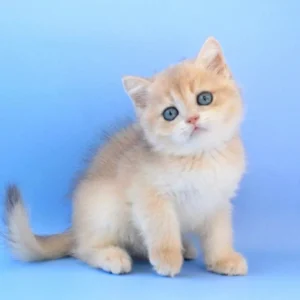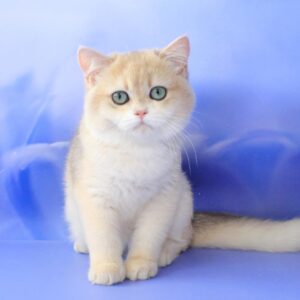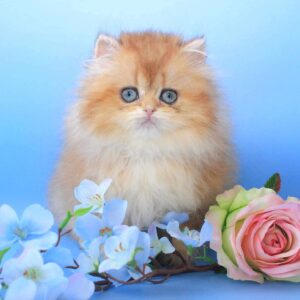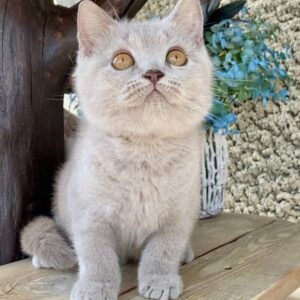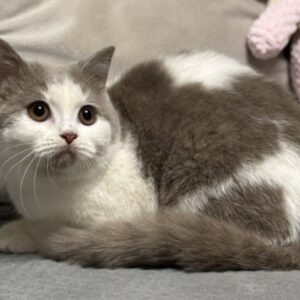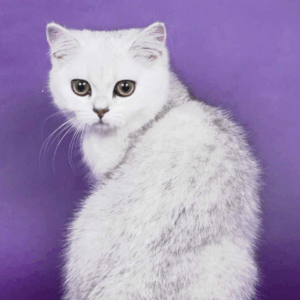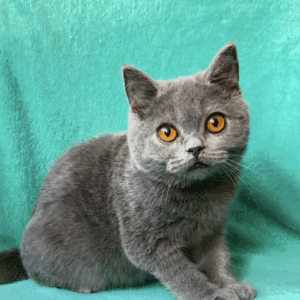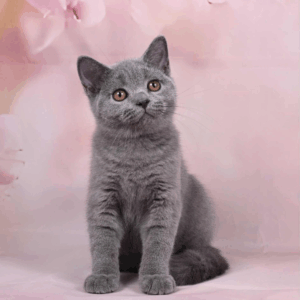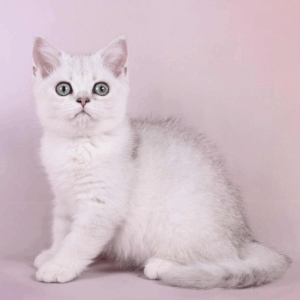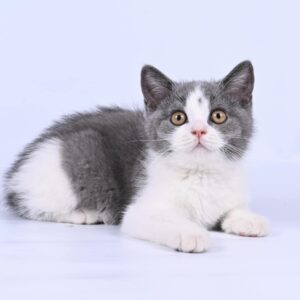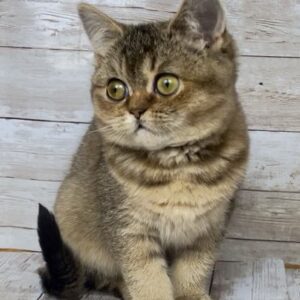British Shorthair Kittens for Sale In Colorado - Maine Coon Maniacs
Do you recognize the British Shorthair cat, as popularized in films such as Alice In Wonderland or Puss In Boots? This low-maintenance cat carries a distinct British air and a round face that melts into the appearance of a wide feline smile. Its affable temperament bodes well with both adults and children. It is one of England’s oldest breeds and is beloved throughout Europe and America today.
British Shorthair Kittens for Sale in Colorado
It seems we can't find what you're looking for.
About British Shorthairs
Brief History
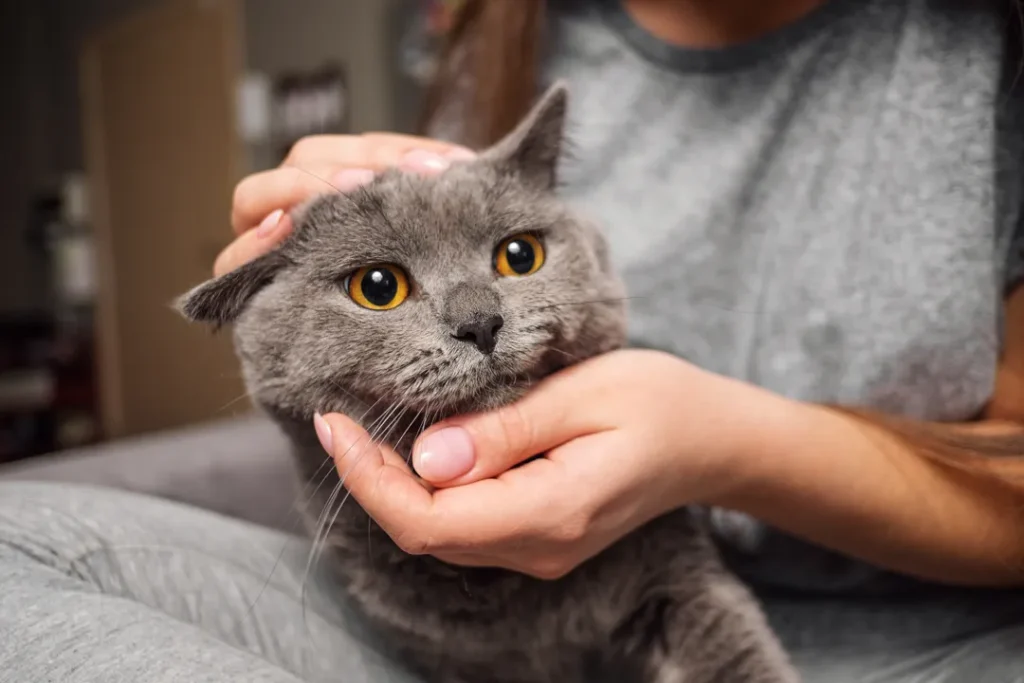
British Shorthair cats are most likely descended from cats that ancient Romans imported from Egypt, before invading Great Britain in 43 A.D. British Shorthairs are considered the oldest breed in England. They once roamed the streets and countryside of England. During the Victorian era in the late 19th century, British Shorthairs experienced a rise in popularity as breeding standards grew stricter.
They were among the first cat breeds showcased in England’s first cat show in 1871. Their numbers diminished heavily as a result of the two World Wars, I and II.
Their modern-day rebirth can be tied to the cross-breeding of a shorthaired English streetcat with either a Persian or a Russian blue cat. The numbers of British Shorthairs have since increased significantly, as the breed has come to resemble the round-faced, affectionate, shorthaired cat we know today. In 1967, the British Shorthair was accepted into the American Cat Association as a recognized breed.
Physical Characteristics
British shorthairs are a medium-size cat, smaller in size than the larger Siberian and Maine Coon cats. A full-grown British shorthair stands 12 to 14 inches high, 22 to 25 inches wide, and weighs between 7 to 17 pounds. British Shorthairs carry a typical lifespan of 15 to 20 years. A British Shorthair cat takes about five years to reach physical maturity. Originally, most British shorthairs were “blue”, which is a variation of a blue-tinged smoky or light grey popular in England.
Through crossbreeding, British Shorthair coat colors come in more than 30 varieties which include “British blue” (smoky or light grey), white, black, cream, red, and silver. They may also be born with a tabby pattern, or a Siamese pattern. Its eyes come in a range of colors as well–blue, gold, copper, or odd-eyed.
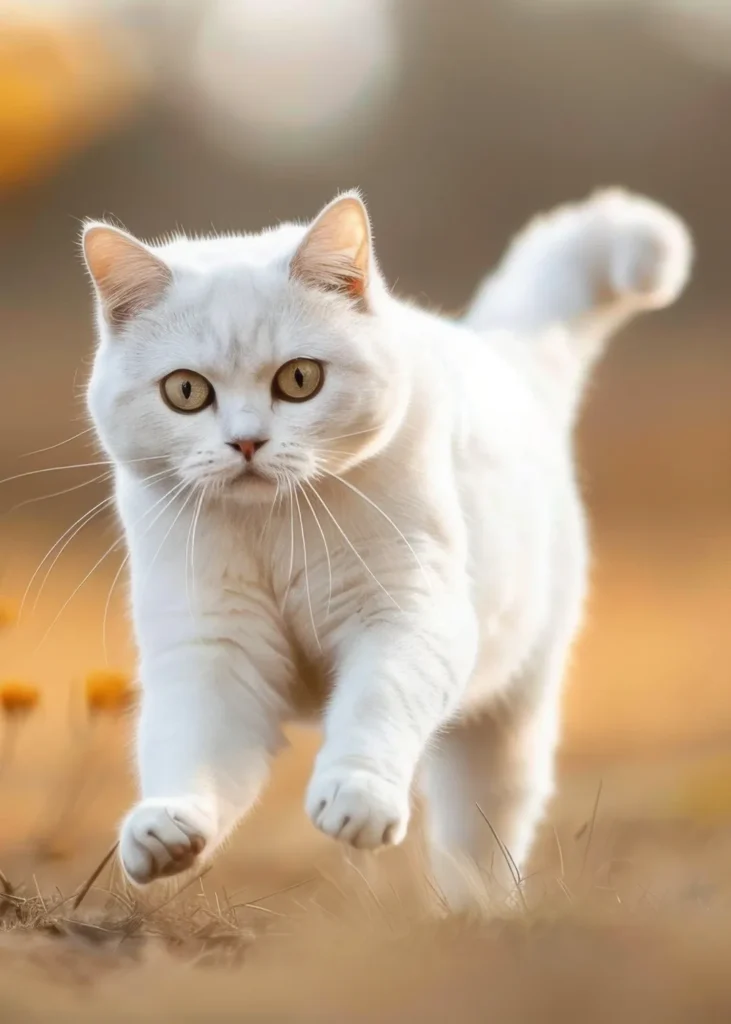
The British Shorthair is most well-known for its trademark blue color and thick, teddy-bear-like frame. The coat is a single coat and breaks crisply along the contour of the cat.
British Shorthairs have a stocky, broad-shouldered build, with a trademark roundness of the face, eyes, and ears—similar to the Cheshire cat in Alice in Wonderland which had a round, chubby face and chipmunk cheeks. The natural muscularity of British Shorthairs supports a broad chest, thick neck, medium-size legs, round paws, and a thick tail.
Temperament and Personality

A British Shorthair cat typically exudes a quiet, dignified temperament. They are known for their “British charm” and calm, affectionate nature. British Shorthairs have a temperament that is not needy. They instead crave independence and a healthy distance. As a result, they tend to get along well with people–whether adults or small children–as well as other pets.
British Shorthairs are easy-going cats with a natural curiosity and intelligence. For example, it is not uncommon for one to learn their owner’s daily routine and follow them from room to room. The docile nature of the British Shorthair cat makes the great indoors an ideal setting. As they become older, British Shorthair cats become more sedentary. They also tend to withdraw from loud noise. British Shorthairs do not like to be carried, as small children should be informed of this temperament trait. Alternatively, they may still enjoy snuggling on the couch.
Health Considerations
Due to the strength of their diverse genetic makeup, British Shorthairs are not susceptible to many of the ailments impacting most cats. However, they are still susceptible to hypertroping cardiomyopathy, gingivitis, and hemophilia B. In addition, their sedentary indoor lifestyle makes them particularly prone to developing obesity, which is a contributing factor to arthritis, heart issues, and diabetes.
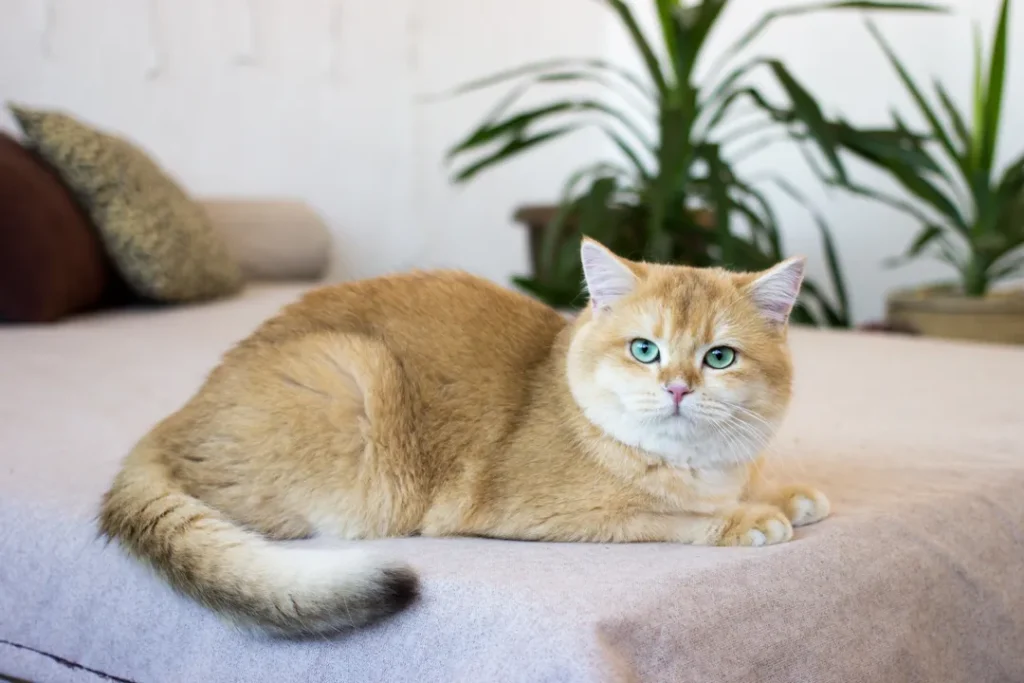
Health conditions the British Shorthair may experience include genetic conditions such as Autoimmune Lymphoproliferative Syndrome and Familial Episodic Hypokalemic Polymyopathy:
- Autoimmune Lymphoproliferative Syndrome: a condition where the immune system causes lymph nodes to become extremely enlarged
- Familial Episodic Hypokalemic Polymyopathy: a condition that causes a British Shorthair to experience muscle pain and weakness
We stress the importance of regular veterinary check-ups for health maintenance and prevention.
Grooming Needs
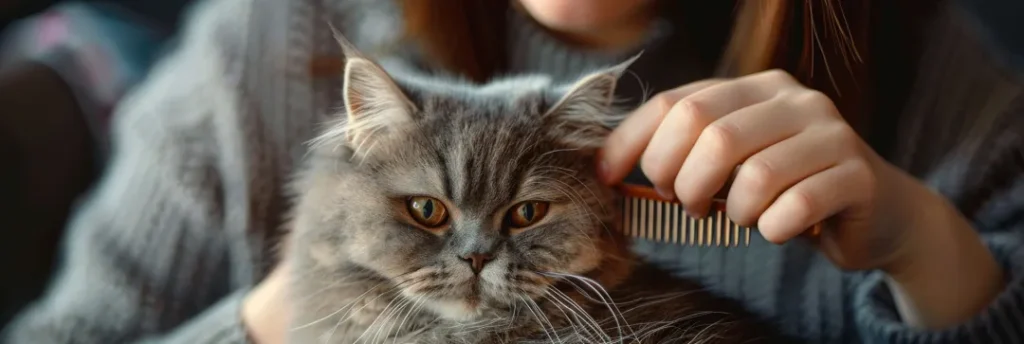
British shorthair cats require minimal grooming. We recommend that you:
- Brush and/or comb their coat one time per week and more during times of heavy seasonal shedding. The short, dense coat simplifies grooming for many pet owners.
- Clip nails every two to three weeks.
- Check ears one time per week. To clean debris from ears, we recommend using a pet-ear cleaner and cotton balls. If your British Shorthair’s ears are extremely dirty or red, we recommend making an appointment with your veterinarian.
Dietary Needs
Due to the sedentary nature of British Shorthair cats, we recommend watching their diet to ensure they do not overeat. They should be fed a high-quality, age-appropriate diet. If your British Shorthair begins to gain weight, monitor their diet intake.
Furthermore, treats should only make up 10% of your pet’s daily calories. They should also have access to clean, fresh water during the day. Young kittens should be fed three times a day, and adult cats twice per day. Avoid leaving food out so that your British Shorthair is not liable to overeat. To determine the best cat food, we recommend consulting your veterinarian.
Ideal Living Environments
British Shorthairs are well-suited for indoor living. They should not go outside without supervision, as their easy-going, docile temperament can endanger them with natural predators such as coyotes or raccoons. Living spaces should have plenty of toys to keep cats occupied—toy mice, feather wands, and cat trees. Cat trees can allow the cat space to climb. In addition, scratching places such as horizontal or vertical scratchers help cats to relieve excess energy and emotions.
Why Choose Maine Coon Maniacs?
Ethical Breeding
Maine Coon Maniacs prioritizes the well-being and welfare of our cats. We only import British Shorthair cats for sale in Colorado from breeders with ethical practices. We work with breeders who prioritize the health and temperament of each litter. Maine Coon Maniacs has developed a reputation for transparency, support, and proof of your kitten to-be’s health background.
As a Colorado-based cattery that works with ethical breeders of British Shorthairs, we:
- Health test cats to identify genetic traits and the potential for disease—as a result, we select cats to minimize the risk of inherited disease, and maintain desirable traits and temperament.
- Avoid breeding a cat frequently so that a mother and kittens receive proper care.
Transparency and Trust
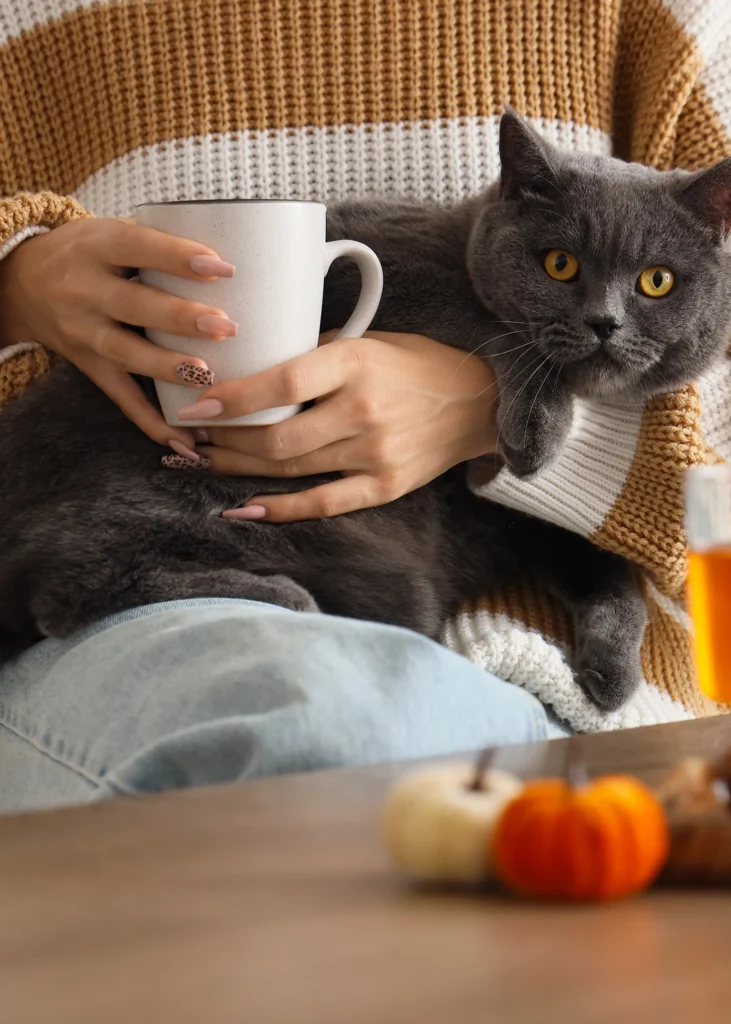
With transparency, Maine Coon Maniacs can help you decide with more certainty that the cat you want is right for you. We maintain an open relationship with potential cat owners. At Maine Coon Maniacs, our team:
- Provides health records of current and past litters, and parents
- Encourages potential owners to visit the cattery to observe the kittens, their parents, and living conditions
- Is transparent about the import process—we work with qualified, licensed breeders to select healthy, well-socialized kittens
Family-Oriented Approach
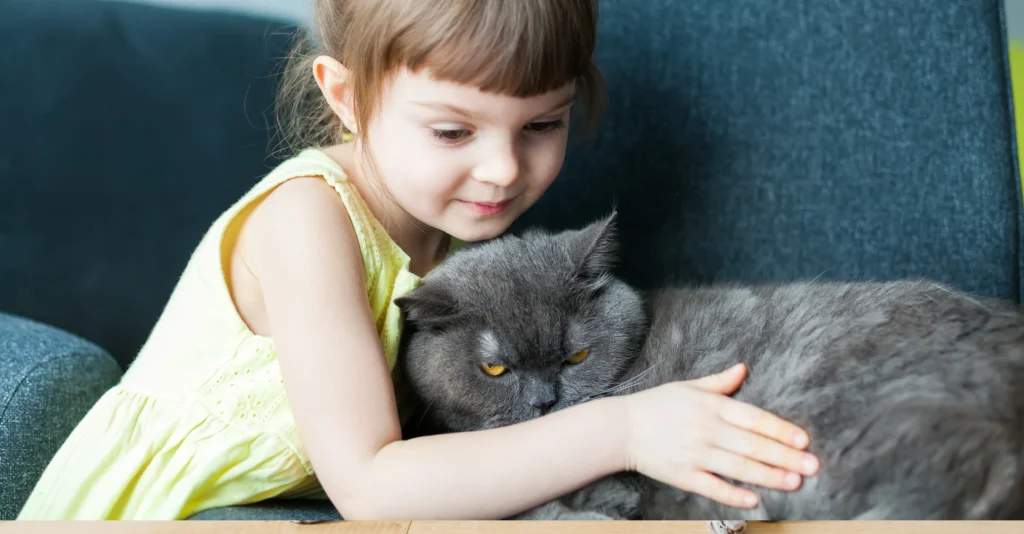
Cats that are positively socialized lead healthy, well-adapted lives. Our family-friendly approach exposes cats to humans during the sensitive time period in their first several weeks of life. Kittens are also exposed to other cats and pets such as dogs. Healthy socialization makes it that much easier to develop the adaptability needed to transition to a new home environment.
Post-Adoption Support
You have a lovely British Shorthair kitten—now what?
Much support exists for new cat owners. Our team is only one phone call away for questions, comments, or concerns. We will gladly provide tips on cat care, or veterinarian recommendations.
Finding Your Perfect British Shorthair Kitten
Choosing a Reputable Breeder
Securing your purr-fect British Shorthair begins with selecting the right cattery. We recommend the following when making your choice for where to buy a British Shorthair.
- Check to make sure that a cattery is licensed to sell specific cats you are interested in. An ethical breeder will be licensed. We are one of few catteries licensed in the State of Colorado.
- Review if a cattery belongs to professional organizations such as The International Cat Association (TICA) and Cat Fanciers’ Association (CFA). Maine Coon Maniacs belongs to both. A reputable cattery should have the desire to continue to build their professional acumen and network within their industry.
- Review the business’s website and online presence for reviews.
- Ensure that the cattery participates in ethical breeding practices such as health testing for genetic background; healthy socialization; and limited litters.
- Observe the level of openness. A reputable cattery should be transparent. They should not hesitate to answer questions or have visitors. Maine Coon Maniacs allows visits once a potential owner has made their cat selection.
- Ensure that the cattery emphasizes the health and temperament of cats, not just their appearance.
The Adoption Process at Maine Coon Maniacs
Here is a step-by-step breakdown of our British Shorthair adoption process in Colorado:
- Prospective owners can browse our available kittens and reserve the one they wish to adopt.
- A non-refundable deposit is required at the time of reservation.
- The remaining balance is due either at the time of kitten pickup or prior to delivery.
- Upon full payment, you may take your new British Shorthair home.
- We encourage you to keep us informed of any questions or concerns as your British Shorthair adjusts to their new environment.
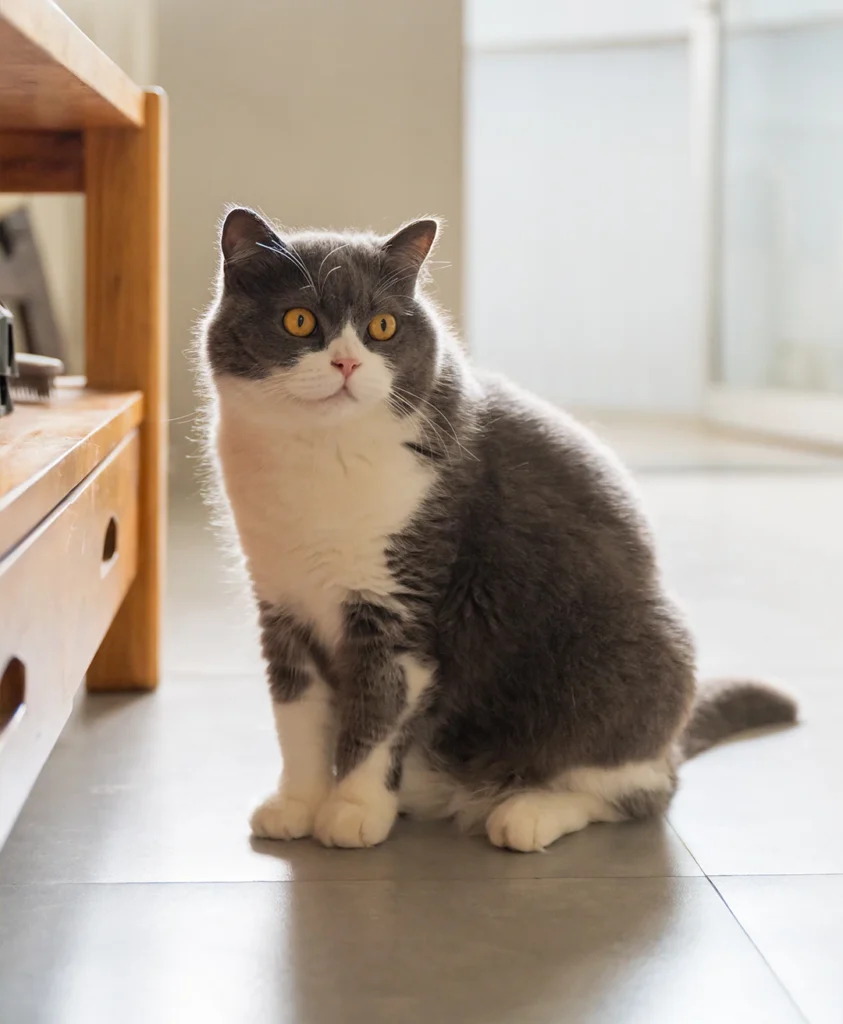
British Shorthair Kittens for Sale in Colorado
Cost Considerations
Owning a new British Shorthair can come with several costs that can easily total up to several thousand dollars per year. A reputable cattery or breeder will likely sell a British Shorthair cat for between $2500 and $4000. Additional fees to caring for a new cat include:
Initial Veterinary Care: $200-$400
This includes a physical examination, vaccines, and deworming.
Supplies: $200-$500
This includes supplies such as a food and water bowl, collar, nail trimmer, crate and beds, litter, climbing tower, brush, litterbox mat, and more.
Food: $30-$60 per month
Regular Veterinary Care (one time per year): $65-$150
Pet Insurance: $30-$40 per month
Expenses add up with pets. We suggest reviewing the different expenses for owning a British Shorthair to make sure that investing in a new cat is right for you.
Meet Our British Shorthairs
It seems we can't find what you're looking for.
Enjoy a Beautiful, Loving British Shorthair Today
British Shorthair cats make a great compliment to humans as pets. If you’d seek a pet that carries a healthy sense of independence while maintaining loving companionship, a British Shorthair may be a match for you! Not to mention that you may also be drawn to its teddy-bear like appearance and charm. Why wait another minute—apply to adopt today!
Showing 13–23 of 23 results
